American Diary
Notes from a massive country
I’ve been in America for ten days now and I’ve already put on half a stone. I’ve driven a thousand miles, from Virginia to South Carolina and back. As people may know, I only travel to confirm my stereotypes and I’m never disappointed. The most obvious one about Americans holds true, too: people are very hospitable and polite and, outside of cities especially, warm and friendly. When I announced I was visiting the United States, a number of subscribers ‘reached out’ (to use my least favourite Americanism) and offered to take me around.
In the capital, Noel Maurer of George Washington University took me to the Casa de Montecristo Cigar bar; Thomas Sprenkle showed me around his home city of Baltimore; in Richmond, Ben Decembrino and Tyler Johnson took me to see some of the sights, including the now monument-less Monument Avenue and to lunch at an old-fashioned gentleman’s club, as well as putting me in touch with the people at the Civil War Museum and Capitol; and in Charleston, Martin Gramling was very generous to take me out to dinner and invite me to his family house in the middle of the beautiful old town.
Everyone insists on paying, and I’m always conscious of playing up to the that well-known archetype, the impoverished British leech playing on American generosity, Peter Fallow in Bonfire of the Vanities being the most famous example.
Everything is familiar, at a remove. As my friend Dominic Green says, there can be no Alistair Cooke’s Letters to America today because we know everything about the place, and not even just from films and television but from memes. The most obvious one, which even British teens are becoming aware of due to TikTok, is that it looks a lot wealthier than Britain. I even saw that popular Twitter talking-point, a supermarket advertising its salaries, which pays two or three times its British equivalent, and more than our prime minister. What would poor Lord North think, knowing that his successor as First Lord of the Treasury earns less than the manager of Buc-ee’s in Florence, South Carolina.
Some people warned about a hostile atmosphere, and I was told that the immigration officials would insist on looking through my social media and ask me pointed questions, and I pictured myself getting detained in a cell with Central American gang members because I’d said something insulting about Trump. Well, that certainly wasn’t my experience: the man at Dulles inquired about what I did for a living, and when I replied ‘writer’, he asked ‘like a journalist’? (How dare you.) He then asked how much money I had, whether I had more than $5,000 on me. I’m a writer, what do you think? I replied in my imagination. He then waved me through and welcomed me to the United States of America.
I stayed with a British friend in Arlington to start with, one of three fellow Brits I’ve visited, all of whom love America and are either intent on staying or are already naturalised. One has an American flag outside his house; none of them can contemplate returning, so dispiriting do they find their homeland, but in particular its lack of patriotism.
I’ve never driven in the US before, and never been to the South, except passing through Charlotte airport. It was also my first visit to Washington DC, which often suffers from a poor reputation overseas, perhaps because other Americans complain about it. The city was notorious when I was growing up as an example of American urban dysfunction; mayor Marion Barry getting caught smoking crack was news in Britain. Today it’s obviously gentrified and felt safe, and the metro is very clean and pleasant; I visit New York later this month and I assume that’s the same, right? (Gulp).
From what I’ve heard, the city has cleaned up a lot since Trump sent in the National Guard, who rather than being a fascist occupation force have no real power to do anything; they just amicably waddle around, reassuring people with their presence.
The area outside Union Station used to be a homeless encampment, and people recall commuters being enchanted by the sight of people defecating in its beautiful hallway. That’s no longer the case, and aside from one insane-sounding man screaming some political message on a Tannoy nearby, the homeless have gone, although you see them around the city.
Halloween is approaching and many suburban houses have an almost absurd level of decoration outside, not just pumpkins but graveyards and 10 ft skeletons; there has been something of an arms race in this area, and we’re still a little behind. Almost as prominent are political signs outside people’s homes: pride flags, ‘immigrants are welcome here’ signs, and anti-Trump messages.
Many American companies have abandoned these political festivals as policies, but the various emblems of progressivism can be found all around, from the entrance to my hotel in Raleigh, North Carolina, stickered all over the bins in Charleston, and outside various Episcopalian churches; wherever wealthy people live, they are keen to demonstrate their philosophy that everyone is welcome. American liberals and British Pakistanis seems to be the only groups on earth keen to advertise their political views on their cars.
This is obviously a class thing: the Carolina backroads were full of the other type of church, the simple evangelical colonial style with signs outside warning that there is ‘only one path to heaven’. Similarly, the only Trump flags I saw were in these poor rural areas, but everywhere is festooned with the American flag, often gigantic (apparently Trump has ordered a bigger flag to be raised outside the White House.)
On my third day here, subscriber Thomas Sprenkle showed me his hometown of Baltimore which is, shall we say, a city of contrasts. Baltimore grew very rapidly in the 19th century, and was for a time one of the largest in the US. Its city centre contains some splendid squares and buildings, quite similar in style to Mayfair or Marylebone, but it was also pretty deserted.
The city then endured a spectacular fall, seeing urban violence in the 1960s and huge rates of white flight, and became well known to many British people through The Wire. The rundown areas of the west seem, if anything, even worse than the show – lots of junkies, corner stores with nothing but liquor stores. A desolate feel. Baltimore also still has plenty of nice areas, and around the university in the north the city suburbs are full of insanely large houses.
I’ve been rereading Paul Johnson’s History of the American People, and he quotes a British observer in the 18th century who said that Americans moved ‘as their avidity and restlessness incite them. They acquire not attachment to Place; but wandering about Seems engrafted in their Nature; and it is weakness incident to it that they Should forever imagine the Lands further off, are Still better than those upon which they are already Settled.’ This is both an advantage and disadvantage.
As you walk into Baltimore’s B&O Railroad Museum you are presented with a painting illustrating all the great men who built the city, but one can’t help but wonder how many of their descendants live here. Thomas, my host and guide, has a long family history in Maryland and Virginia, as well as being a Baltimore native, but that’s pretty unusual. We also paid a visit to Edgar Allan Poe’s grave in Westminster Presbyterian Church, which likewise contains the remains of many great men and women whose posterity have all left.
After Washington, I headed south, first to Richmond, Virginia, where I saw my first Palestinian flag, which made me homesick for north London. The area around Monument Avenue is quite a Democrat area, judging by the political signs, including those for the upcoming Virginia governor’s election. I’m also guessing that this local driver will not be voting for the Republicans.
Afterwards I had a tour of the Virginia State Capitol, the first example of classical architecture in the new United States. Thomas Jefferson had been inspired, while ambassador to France, by the Maison Carrée of Nîmes; the Roman influence on America is a subject that fascinates me, and it’s obvious in Washington too, where I couldn’t help but feel like a Greek imperial subject visiting the Eternal City for the first time, and marvelling how many denarii the tavern-owners earn.
After returning from South Carolina I also visited Monticello with my friend Chris Bullivant, who lives in nearby Charlottesville, which again reflects Jefferson’s great interest in classical Rome, via his time in France. Kenneth Clark described Jefferson as ‘the universal man of the 18th century’ – enlightened, sceptical, religiously tolerant but also curious about everything. His home is testimony to his vast interests in history, nature and science. Of course, one cannot study his home without also thinking about the ‘enslaved people’, and they do mention it, obviously.
Jefferson had grown up nearby, and his home was then on the frontier, facing this vast abundant continent. America is obviously extremely large (did Cooke ever tell you that fascinating fact?) but it is also bountiful; one can see how the idea of manifest destiny is impossibly attractive, when men found themselves in possession of this gigantic Garden of Eden. The downside is that, being so large and open, people are free to leave their homes and cities when they fall to pieces.
America is familiar to us but it is also strange and alien, in a way that neighbouring European countries are not. As an example, when I arrived in South Carolina I noted that many of the shops have signs warning about concealed weapons, and the state indeed has very unrestricted laws about carrying guns.
When in Rome and everything, I visited a gun shop where the friendly, talkative man behind the counter insisted I have a feel of various revolvers. I’d like to relay all the specifics of what he told me but in all honesty I have no interest in guns and everything he said drifted out of the other ear immediately. He may as well have been telling me the specifics of different types of pylons.
The store owner asked about Britain and whether people are getting arrested for what they say; this is a common refrain here, even from those who don’t know I’m a writer. The idea seems so completely alien, and horrifying, to them. Their impression of Britain seems to be very negative, and a man whom I thought worked in the shop told me I should ‘get out’ and come to the land of the free (apparently he didn’t actually work there, but some men just like hanging around gun shops so they can talk about guns.)
I wasn’t allowed to take photos of the firearms, but I did manage to get some nice merch shots; I was tempted to buy one for a laugh, but am I really going to walk around Crouch End dressed like this? (And besides which, the prices are not Europoor friendly.)
America’s gun culture attracts a great deal of attention, but the car culture is even more alienating. That feels like the most negative thing about life here. Baltimore, for example, contains some incredibly beautiful housing, but its often on roads with six lanes and speeding cars. There’s no way you’d want to raise children like this, and this wasn’t unusual.
Many of the towns I passed through were totally car-dominated, the result of which is that they are quite desolate, and no one is walking around creating a sense of civic life. I don’t know how people can live like that. This is especially true in the South, and in Republican-run areas, while Democrat towns make more effort to create pedestrian zones; the only downside is that they are full of homeless people muttering to themselves, and the smell of weed, which also destroys civic life. Cars and crime are the twin enemies of urban civilisation.
Every culture has its preferences, but I would go mad if I couldn’t walk, or take public transport, and I suppose the experience has further radicalised me. I’m like Sayyid Qutb visiting Colorado in the 1950s and inventing modern Islamic fundamentalism because he got so angry at seeing people dance, but with cars rather than sex.
(Your car makes you a king, but as I learned, you will get a ticket if you park it in the wrong direction – one of the most bizarre rules I’ve ever heard of. Land of the Free, my arse ).
Driving here takes some getting used to, in part because I had very little experience of using an automatic; it’s hard to get out of the habit of pressing down the brake and accelerator because you’re trained to worry about stalling. Americans also drive very aggressively: everyone overtakes on the inside, and often fail to indicate, and it’s no surprise that the country’s road fatality rate is vastly higher than Europe’s. Also, the cars are gigantic; I rented a ‘medium’, which would have been a curiosity in my neighbourhood for its size.
The driving experience is also quite dispiriting, especially compared to the only real European equivalent, of a large, sparsely populated country – France. The road is littered with advertising, about half of which are for lawyers offering potential pay-out from accidents. ‘Turn your wreck into a check’ was probably the funniest. One contained the image of a lorry smashing into a real car wreck, suspended onto the advertising board. Another 5-10 per cent of adverts were religious messages, which become more prominent as you go further south: JESUS SAVE ME written in bag letters. Europeans often find American religiosity quite alienating, but it is intimately tied to their welcoming culture.
Driving wasn’t all bad: listening to Johnny Cash on the freeway is fun, and the view of the Virginia hills is majestic, or the pink glow of nightfall as I passed through North Carolina. But most of the time it’s very aesthetically demoralising, and the motorway service areas are really bleak – every stop looks like one of those ‘which way, western man’ memes. I will never say a bad word about Watford Gap again. I stopped for pancakes at one place, simply because it advertised ‘Country ham and eggs. Jesus is Lord’, and it was as expected, full of people saying ‘sir’ but also home to the American poor. They look different to the British poor, more downtrodden in some ways; also, more unhealthy, because much of the junk food and confectionery here feels almost poisonous. (Robert Kennedy Junior is clearly right about that.)
The bleakest point was stopping for a break and finding myself in this giant theme park called South of the Border. It was pouring with rain, and empty. Stopping to turn around, I found myself outside a ‘Guns and Ammo’ store which had a sign warning that, in the event of trouble, the entire shop would be filled with CS gas. And so it was a relief to arrive in Charleston, commonly referred to as America’s beautiful city, and I can certainly see why. But I think that deserves an essay of its own.


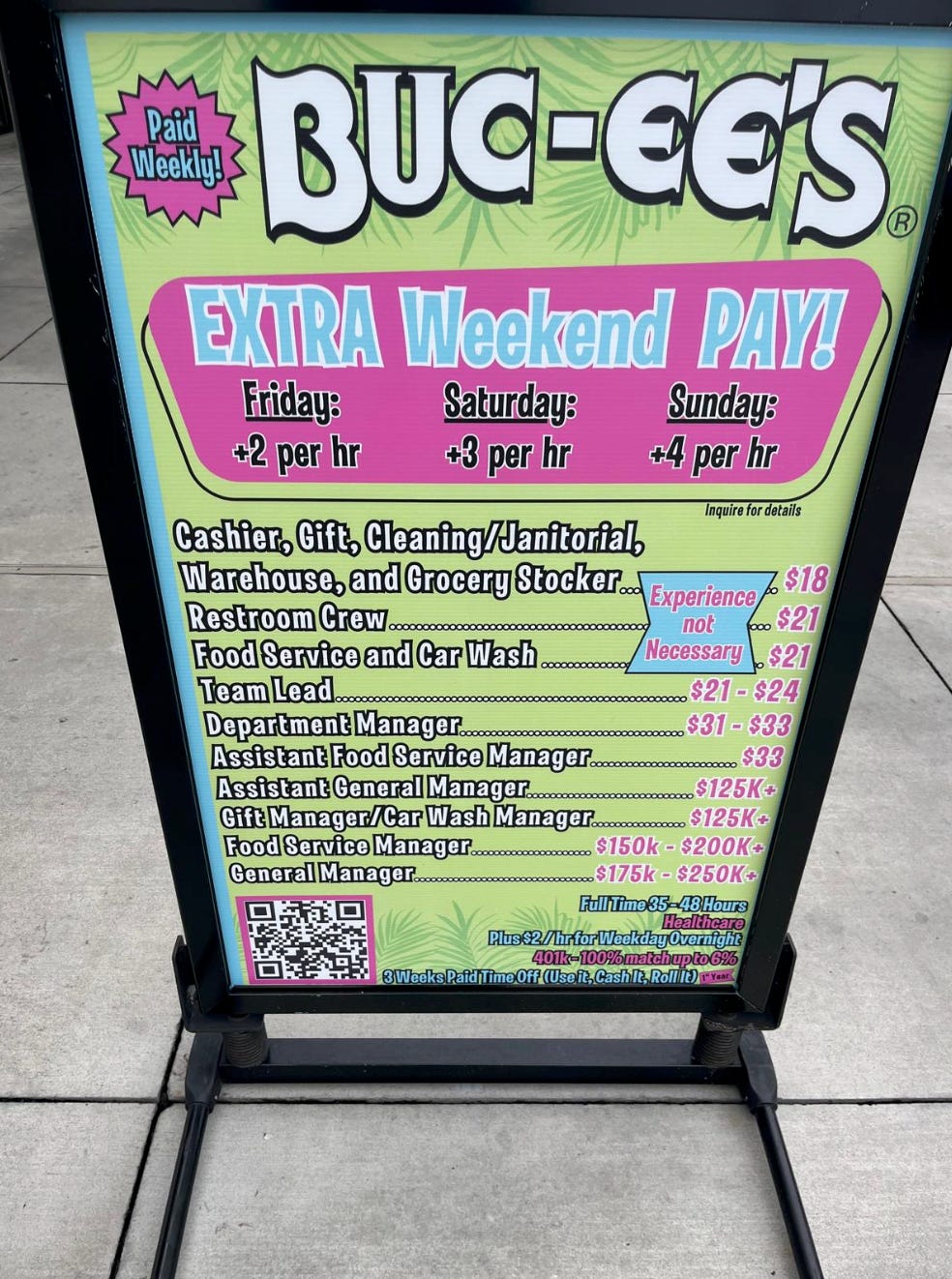
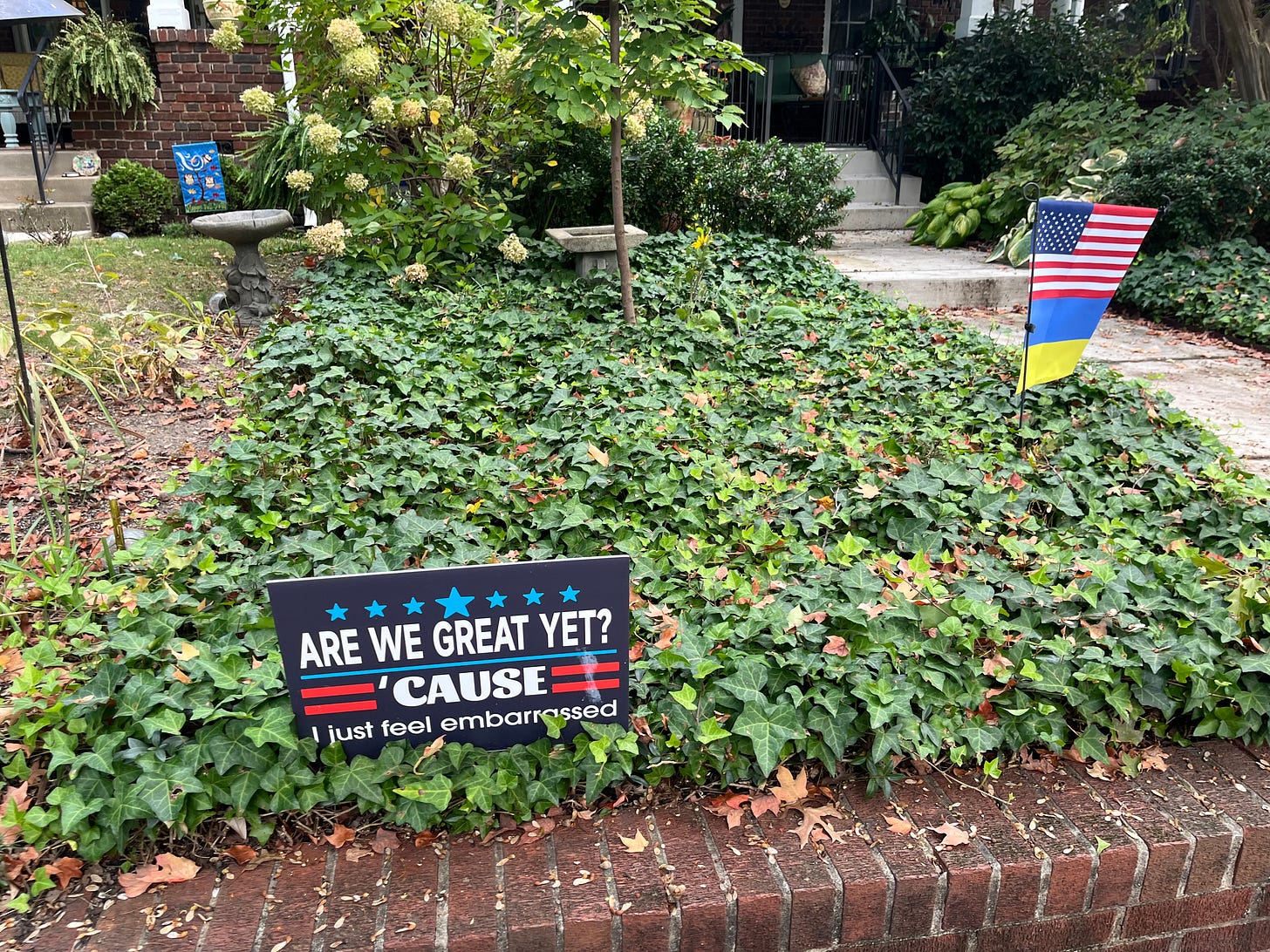
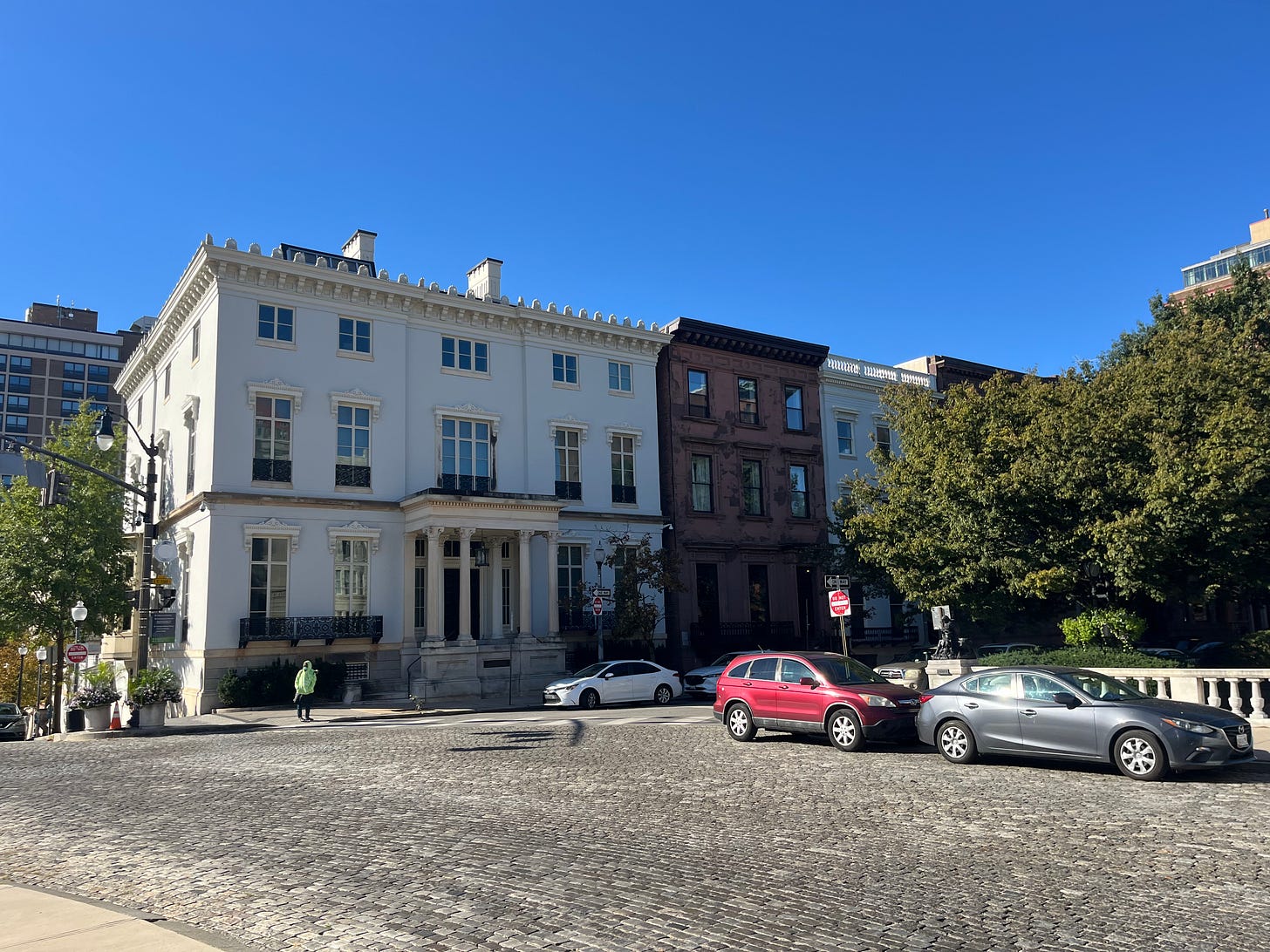
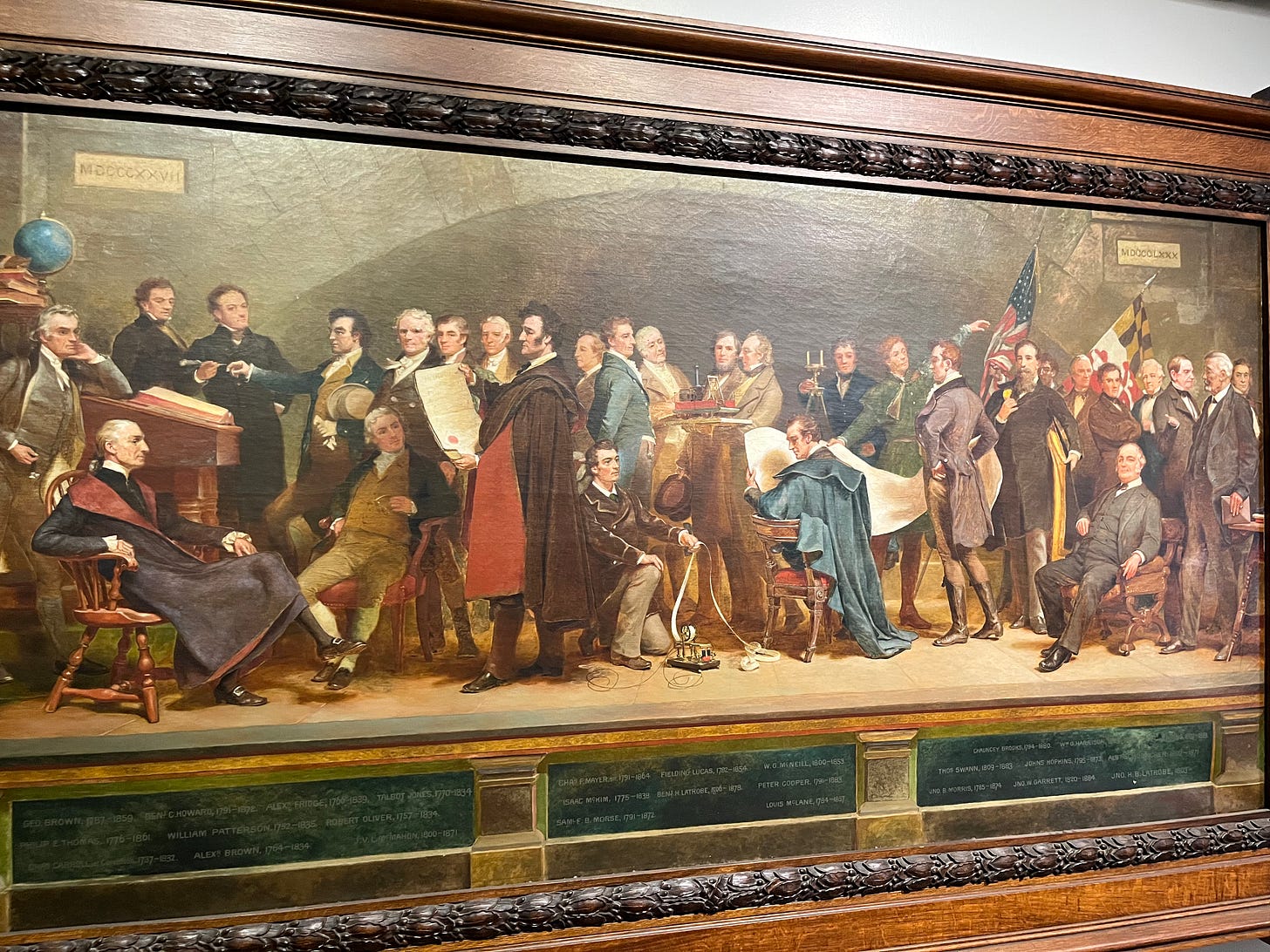
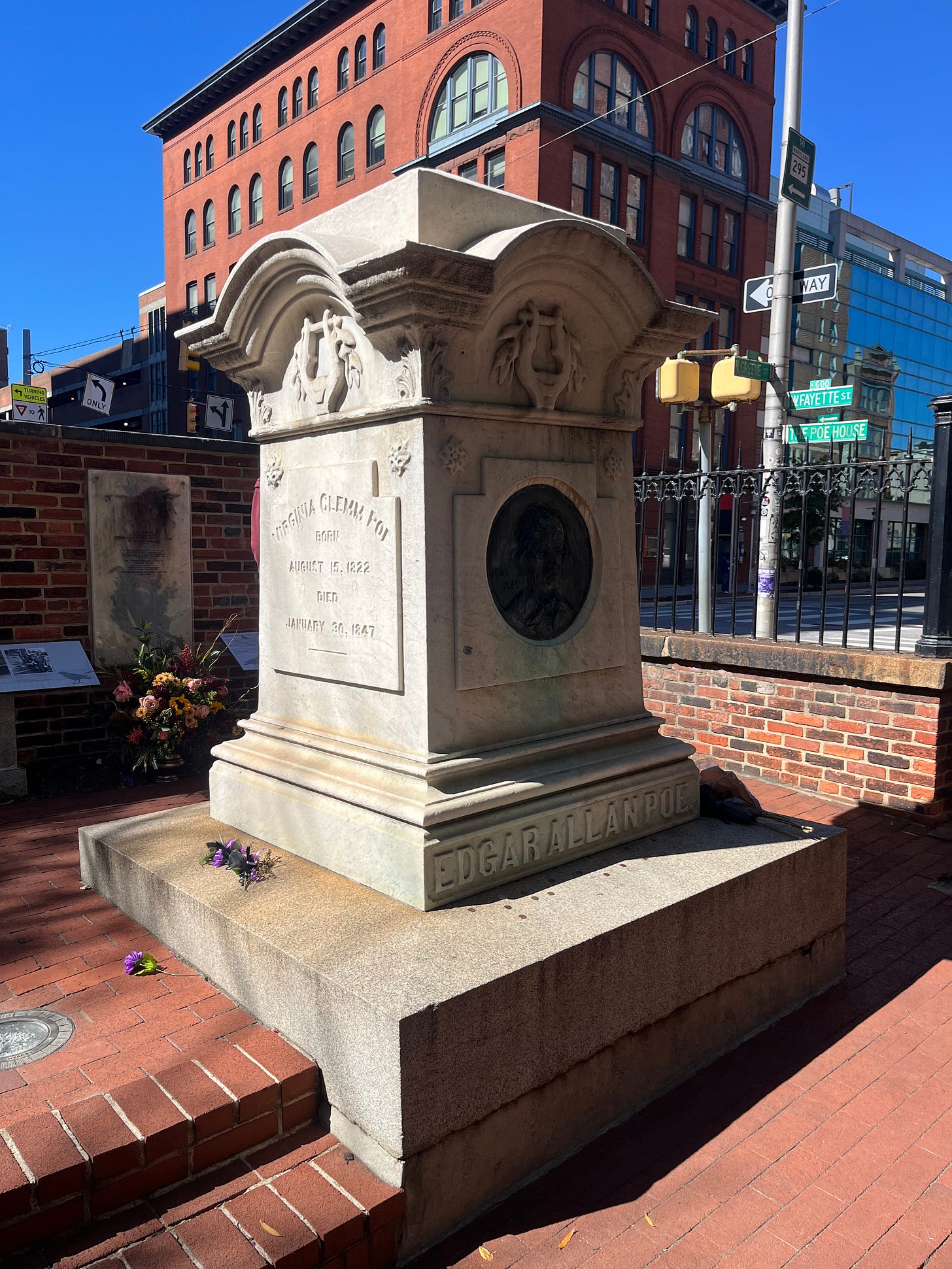
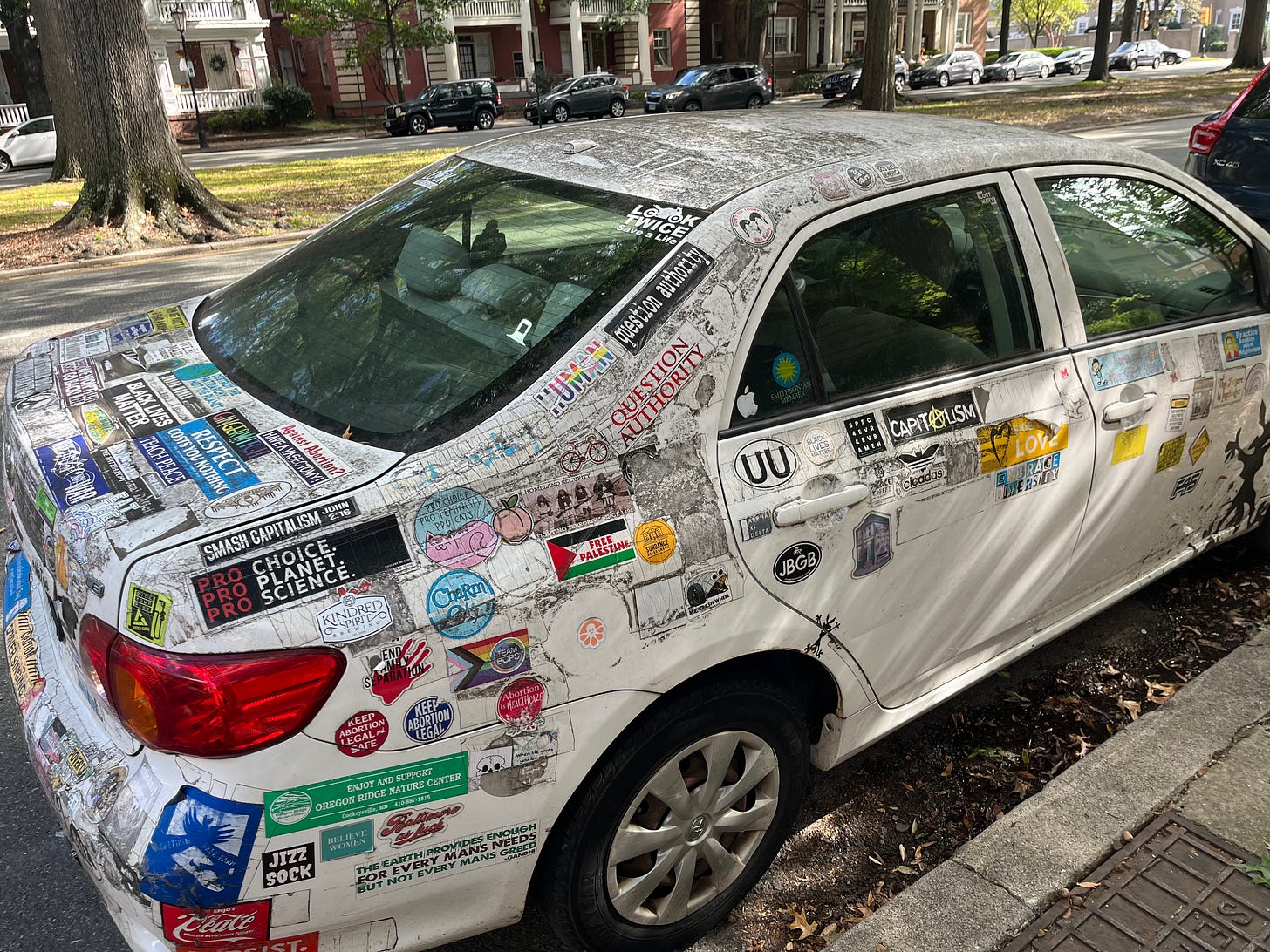
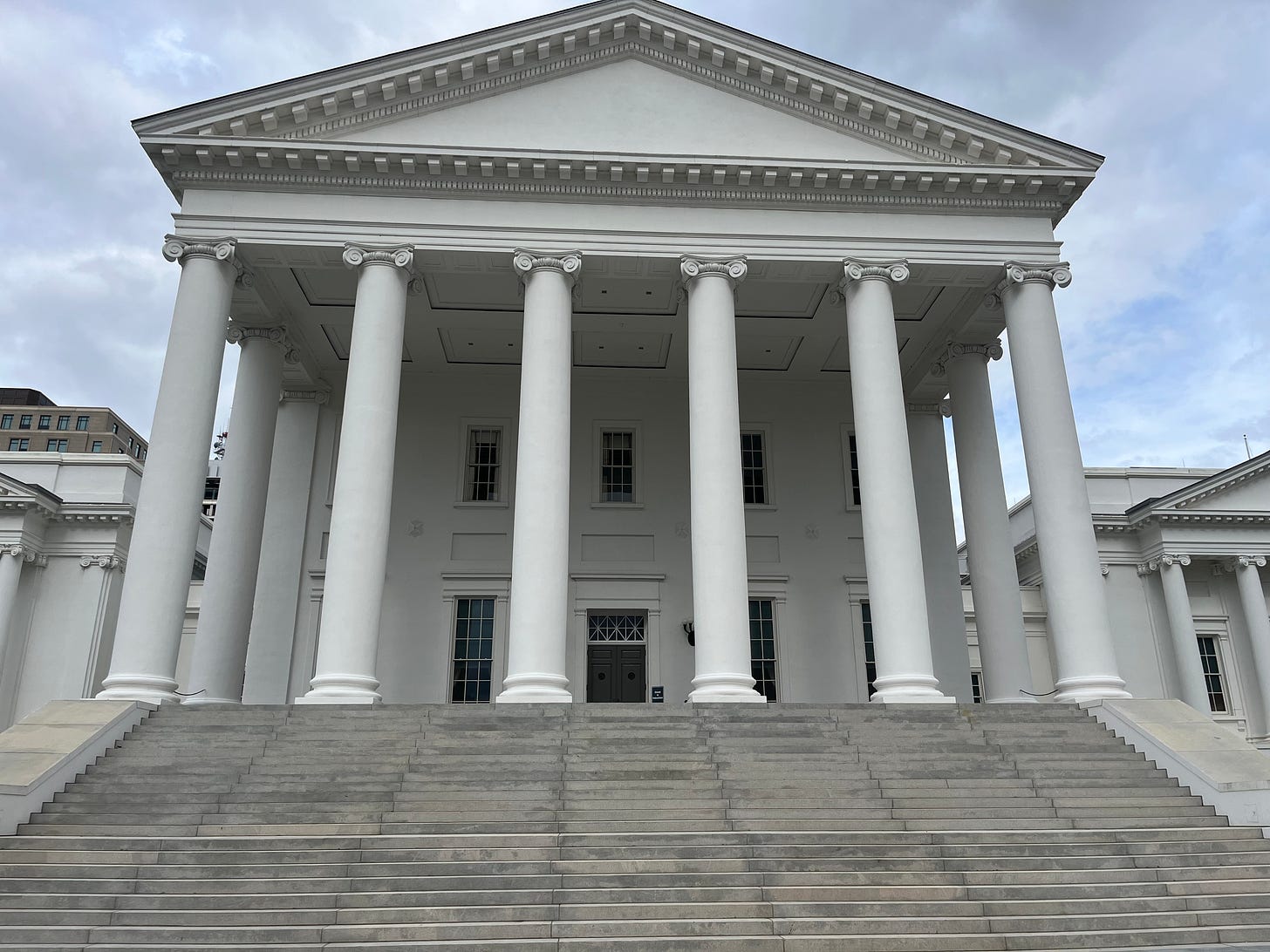

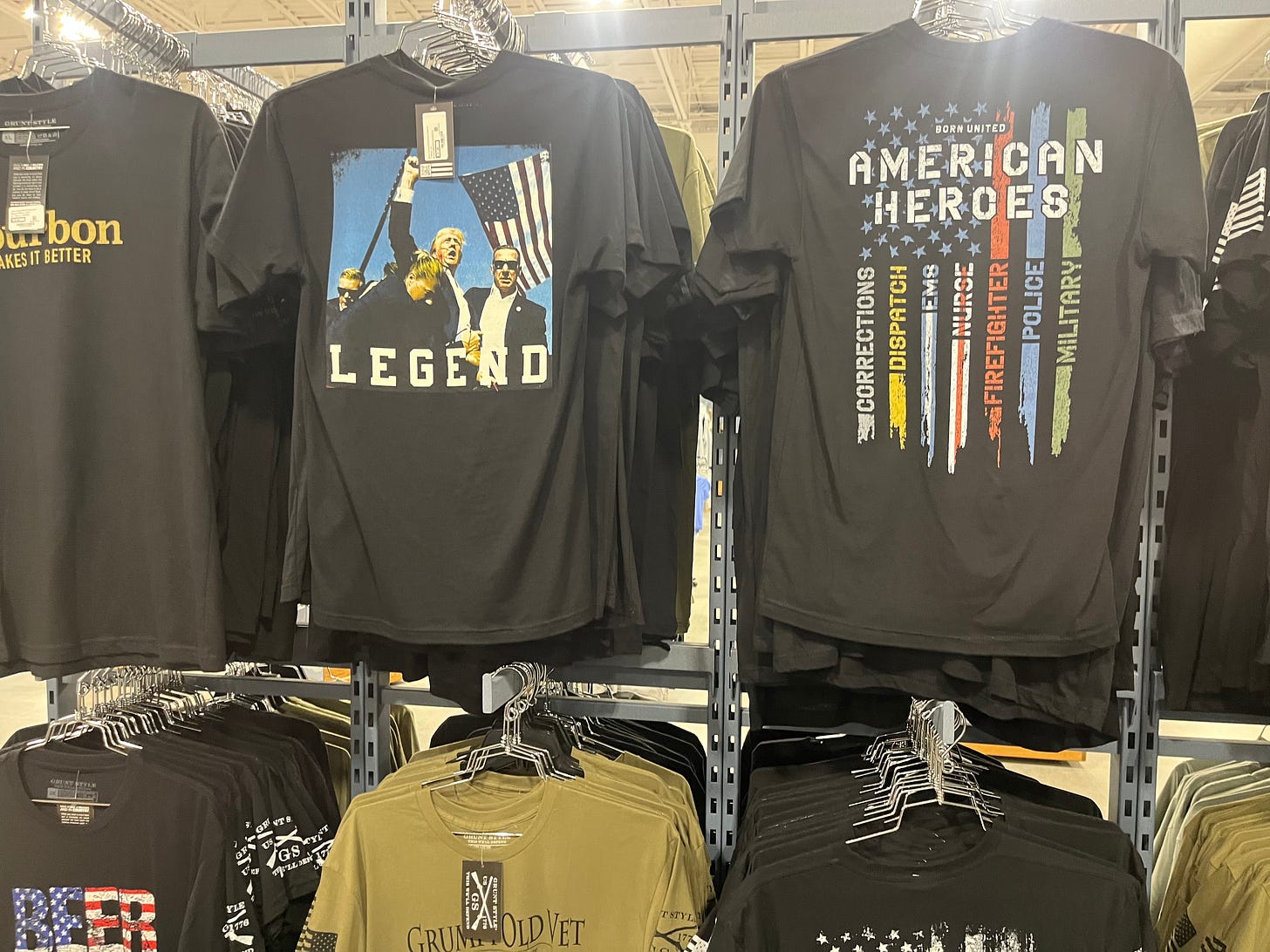
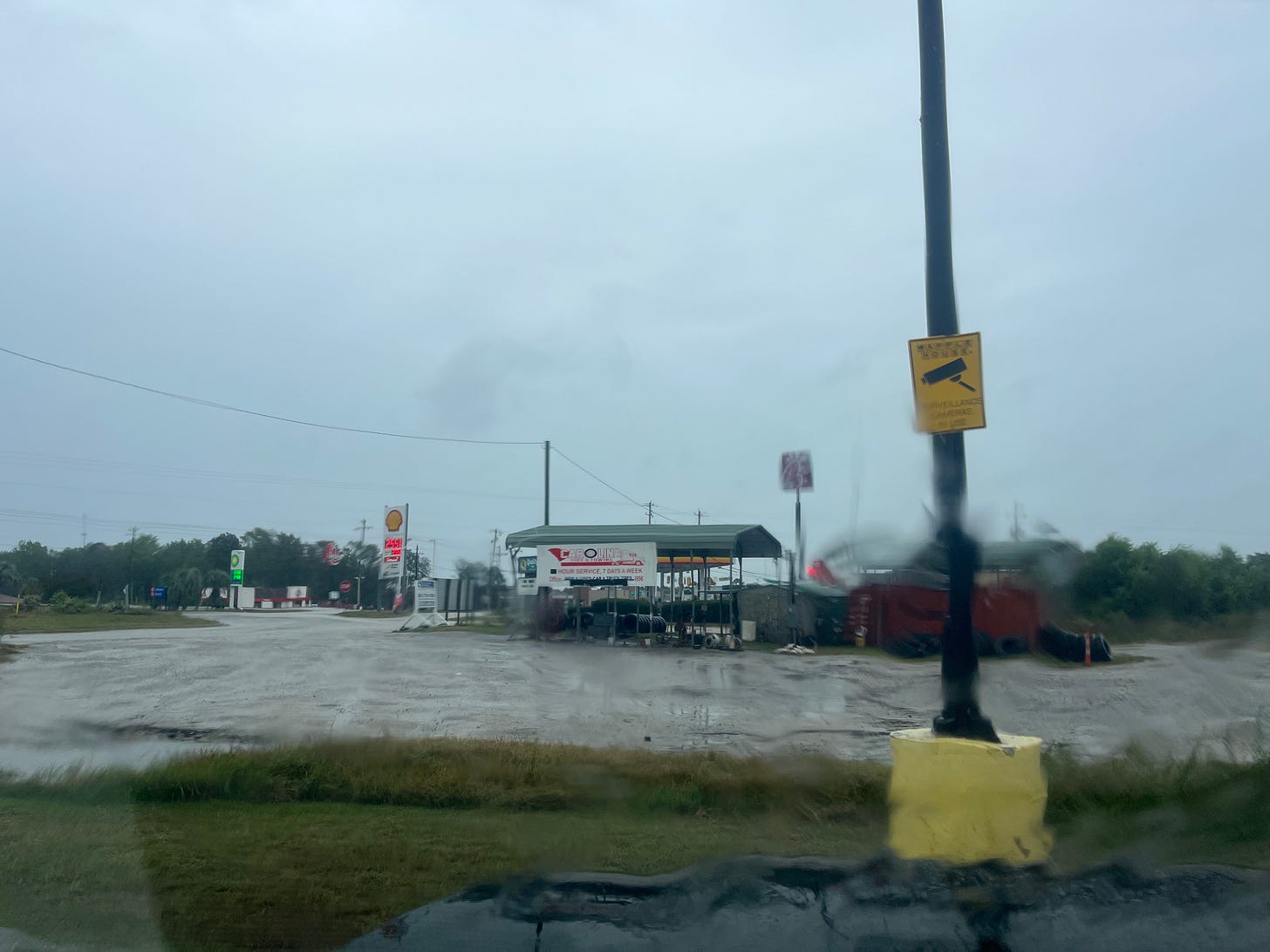
What a great piece of writing!
Looking at that bleak photo taken from the car reminded me of something Robert M. Pirsig wrote. At one point on his travels he came to a place where it was clear that the land was plentiful and cheap because no one had bothered use it economically. Everything had just been thrown up in random places making it look cluttered.
"Americans also drive very aggressively: everyone overtakes on the inside, and often fail to indicate, and it’s no surprise that the country’s road fatality rate is vastly higher than Europe’s."
You are so right. For many years, "Visualize Using Your Turn Signal" has been seen on bumper stickers. It's a response to "Visualize World Peace", which was probably somewhere on that car in Richmond. One might also see "Visualize Whirled Peas".
One reason for having stickers or magnets (easier to remove!) is so that you can find your car in a parking lot among all the other black Nissan Altimas or red Honda Civics.